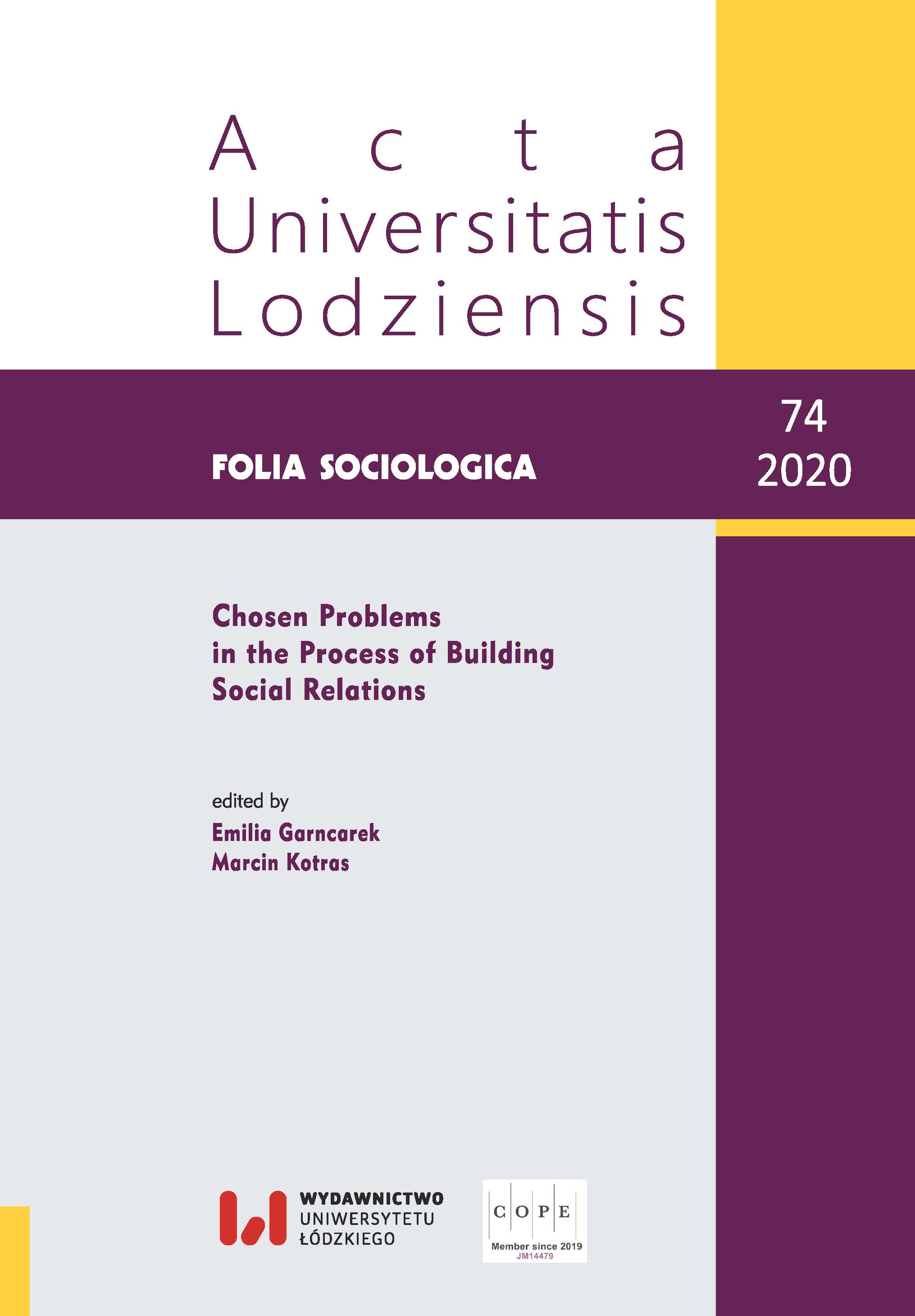The Pakistani community in Spain: social and cultural challenges
DOI:
https://doi.org/10.18778/0208-600X.74.07Keywords:
Spain, Pakistani immigrants, distinctiveness, coexistenceAbstract
This article uses the example of the Pakistani community to explore the phenomenon of multiculturalism in Spain. Although Muslims of Maghrebi origin constitute the most numerous immigrant group on the Iberian Peninsula, the Pakistanis are special in that they represent an exceptionally distinctive and hermetic community. The article analyses social, economic and cultural determinants of this community’s situation in Spain. The Raval immigrant neighbourhood in Barcelona exemplifies the mechanisms under study. The article focuses on determinants of Pakistani immigrants’ situation as well as the challenges that arise against the backdrop of interaction between this community and the host society. The author also reflects on the issue of the ethnocultural distinctiveness of this group in normative and institutional terms, and analyses the consequences of this distinctiveness.
References
Aguilera-Carnerero C. (2018), Islamophobia in Spain. National Report 2017, [in:] E. Bayrakli, F. Hafez (eds.), European Islamophobia 2017 Report, SETA, Foundation for Political, Economic and Social Research, Istanbul–Washington D.C.–Cairo, pp. 599–616.
Google Scholar
Aretio Romero A. (2013), La violencia de género contra las mujeres pakistaníes residentes en Logroño, “Asparkía”, no. 24, pp. 105–124.
Google Scholar
Ashraf T.M. (2008), Pakistan’s army and the war on terrorism in the post-Musharraf era, “Terrorism Monitor”, vol. 6(17), pp. 125–137.
Google Scholar
Beltrán Antolín J., Sáiz López A. (2007), La comunidad pakistaní en España, “Anuario Asia-Pacífico”, no. 1, pp. 407–416.
Google Scholar
Berry J.W. (1997), Immigration, acculturation, and adaptation, “Applied Psychology: An International Review”, vol. 46(1), pp. 5–68.
Google Scholar
DOI: https://doi.org/10.1111/j.1464-0597.1997.tb01087.x
Biernacka M. (2012), Hiszpania wielokulturowa. Problemy z odmiennością, Wydawnictwo Naukowe Scholar, Warszawa.
Google Scholar
¿Cometen los extranjeros más delitos que los españoles? (2019), https://www.parainmigrantes.info/cometen-los-extranjeros-mas-delitos-que-los-espanoles/ (accessed 6.12.2019).
Google Scholar
de la Corte Ibáñez L. (2010), Pakistán ante la amenaza yihadista: evolución y alcance de la respuesta estatal, “Documento de Trabajo”, no. 10, Real Instituto Elcano.
Google Scholar
Detenidos ocho empresarios pakistaníes por explotar a los inmigrantes en fruterías en Zaragoza (2019), “El Español”, 20th April.
Google Scholar
Estudio demográfico de la población musulmana. Explotación estadística del censo de ciudadanos musulmenes en España referido a fecha 31/12/2017 (2018), “Observatorio Andalusí”, Unión de Comunidades Islámicas de España, Madrid.
Google Scholar
Fuentes A. (2012), España y Pakistán, dos grandes desconocidos, “UNISCI Discussion Papers”, no. 29, May, pp. 133–145.
Google Scholar
García España E. (2018), La delincuencia y la inmigración: dos fenómenos sin relación, https://www.eldiario.es/andalucia/novus-orbis/delincuencia-inmigracion-fenomenosrelacion_132_1101852.html (accessed 7.12.2019).
Google Scholar
Giménez-Salinas Framis A. (2018), El tráfico de cocaína como mercado ilícito global: el papel de España, Real Instituto Elcano, 19th April, pp. 2–47.
Google Scholar
González Enríquez C. (2019), Inmigración en España: una nueva fase de llegadas, Real Instituto Elcano, 5th March, pp. 1–9.
Google Scholar
Grzymała-Kazłowska M. (2013), Od tożsamości i integracji do społecznego zakotwiczenia – propozycja nowej koncepcji teoretycznej, “CMR Working Papers”, vol. 64(122), pp. 1–18
Google Scholar
Hongdao Q., Bilawal Khaskheli M., Rehman Saleem H.A., Gsell Mapa J., Bibi S. (2018), Honor killing phenomena in Pakistan, “Journal of Law, Policy and Globalization”, vol. 73, pp. 169–176.
Google Scholar
Huysmans J. (2000), The European Union and the securitization of migration, “Journal of Common Market Studies”, vol. 38, issue 5, pp. 751–771.
Google Scholar
DOI: https://doi.org/10.1111/1468-5965.00263
Informe Anual. Islamofobia en España 2017 (2018), Plataforma Ciudadana Contra la Islamofobia, February.
Google Scholar
Jacher M. (2006), Integracja a adaptacja kulturowa w społecznościach pogranicza – na przykładzie Śląska Opolskiego, “Studia Etnologiczne i Antropologiczne”, no. 9.
Google Scholar
Janeta M. (2011), Migranci a społeczność przyjmująca. Uwarunkowania strategii akulturacyjnych a kontakty ze społecznością przyjmującą, “Studia Migracyjne – Przegląd Polonijny”, vol. 39, no. 2(140), pp. 85–95.
Google Scholar
Kosmynka S. (2015), Święta wojna w Al-Ándalus. Przeobrażenia aktywności dżihadystycznych komórek terrorystycznych w Hiszpanii w latach 1995–2012, Wydawnictwo Uniwersytetu Łódzkiego, Łódź.
Google Scholar
Kosmynka S. (2016), Wyzwania dla bezpieczeństwa Hiszpanii ze strony dżihadyzmu w kontekście oddziaływania tzw. Państwa Islamskiego, [in:] J. Iwanek, E. Tarnawski (eds.), ¿Adónde vas, España?, “Przegląd Narodowościowy – Review of Nationalities”, no. 5, pp. 179–193.
Google Scholar
López H. (2019), Mujeres pakistaníes en Barcelona, luchadoras contra la invisibilidad y el estereotipo, “El Periódico”, 11th March, pp. 11–16.
Google Scholar
Mushtaq Abbasi N. (2010), The Pakistani Diaspora in Europe and Its Impact on Democracy Building in Pakistan, International Institute for Democracy and Electoral Assistance, Stockholm.
Google Scholar
Parellada E. (2014), Pakistaníes en España: lucha por la legalidad, “Casa Asia”, 9th December, pp. 24–33.
Google Scholar
Reinares F., García-Calvo C. (2014), Cambios recientes en la caracterización social y las conexiones internacionales del terrorismo yihadista como amenaza para España, “Comentario Elcano”, no. 42, Real Instituto Elcano, pp. 1–3.
Google Scholar
Sadowski A. (2011), Socjologia wielokulturowości jako nowa subdyscyplina socjologiczna, „Pogranicze. Studia Społeczne”, vol. XVIII, pp. 5–25.
Google Scholar
DOI: https://doi.org/10.15290/pss.2011.18.01
Sánchez G. (2017), De Pakistán a Raval, la ruta de la heroína, “El Periódico”, 8th September, pp. 4–9.
Google Scholar
Solé Aubia M., Rodríguez Roca J. (2005), Pakistaníes en España; un estudio basado en el colectivo de la ciudad de Barcelona, “Revista CIDOB d’Afers Internacionals”, no. 68, Fundació CIDOB, pp. 97–118.
Google Scholar
Unos padres inmigrantes pakistaníes en España, dan una paliza a su hijo po ser Gay: Otro caso silenciado (2019), “Tormenta 78”, 14th July, pp. 21–24.
Google Scholar
Vicente Á. (2016), Insurgencia y terrorismo en Pakistán tras la operación Zarb-e-Azb, Real Instituto Elcano, 6th June, pp. 1–11.
Google Scholar
Walczak G. (2012), Muzułmańscy uchodźcy ze względu na orientację seksualną – doświadczenia hiszpańskie, [in:] K. Górak-Sosnowska (ed.), Queer a islam. Alternatywna seksualność w kulturach muzułmańskich, Smak Słowa, Sopot.
Google Scholar
Zasuń A. (2018), Islam w Europie czy “europejski islam”? Wybrane aspekty obecności muzułmanów w Europie, “Acta Politica Polonica”, no. 1(43), pp. 27–37.
Google Scholar
DOI: https://doi.org/10.18276/ap.2018.43-03
Ziętek A.W. (2017), Sekurytyzacja migracji w bezpieczeństwie kulturowym Europy, “Teka Komisji Politologii i Stosunków Międzynarodowych”, vol. 12(3), pp. 23–42.
Google Scholar
DOI: https://doi.org/10.17951/teka.2017.12.3.23
Downloads
Published
How to Cite
Issue
Section
License

This work is licensed under a Creative Commons Attribution-NonCommercial-NoDerivatives 4.0 International License.










